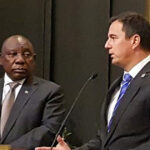JOHANNESBURG, South Africa – In a stunning turn of events, the African National Congress (ANC), the political powerhouse that has reigned over South Africa since the end of apartheid, finds itself at a crossroads after losing its parliamentary majority in the recent elections. As the nation eagerly awaits the formation of a new government, the ANC has expressed its inclination towards a government of national unity. However, this proposed alliance faces significant hurdles as other parties weigh their options and make their demands known.
The party's spokesperson, Mahlengi Bhengu-Motsiri, revealed that discussions have been held with five parties, spanning the political spectrum, including the free-market-oriented Democratic Alliance (DA) and the Marxist Economic Freedom Fighters (EFF). Bhengu-Motsiri emphasized that the idea of a government of national unity aligns with the desires expressed by the South African people. The ANC's National Executive Committee will convene on Thursday to deliberate on the available options.
With 159 seats out of 400 in the new National Assembly, the ANC will need to forge alliances to establish a ruling coalition. However, the DA has made it clear that it will not participate in a government that includes smaller rival parties such as the EFF and the far-right Patriotic Alliance (PA). Werner Horn, the DA spokesperson, stated, "Our negotiating team will not be empowered to conclude such an arrangement." Any potential change in the DA's stance would require approval from the party's federal governing bodies.
The EFF, known for its radical proposals such as nationalizing mines and banks, has not yet commented on the possibility of joining a government of national unity. The uncertainty surrounding coalition negotiations has caused fluctuations in the South African rand exchange rate, reflecting the concerns of the market.
An internal ANC document, verified by Celeb Gossip News, highlights the advantages of a unity government, emphasizing inclusivity and the avoidance of unpopular coalition partners. However, the document also acknowledges the challenges of managing a diverse group of partners with differing interests, potentially leading to instability and gridlock.
Bhengu-Motsiri stressed the ANC's goal of uniting various sectors of society in support of the future government. Talks are expected to conclude within a week, with President Cyril Ramaphosa remaining in office. The ANC has cautioned other parties against demanding Ramaphosa's removal as a precondition for joining the government.
The business sector and investors favor a coalition between the ANC and the DA, which advocates pro-business policies and the revision of certain black empowerment measures. However, such a collaboration may face resistance from the ANC's core supporters. The South African Communist Party, a significant ally of the ANC, opposes a coalition with the "right-wing, DA-led anti-ANC neo-liberal forces." The influential COSATU trade union group, another ANC supporter, has also expressed reservations about aligning with the DA.
Meanwhile, the PA, known for its strong stance on immigration, remains open to joining any government that fulfills its main campaign promises, including the "mass deportation of all illegal immigrants."
Political analyst Melanie Verwoerd, a former ANC lawmaker, believes that the ANC's primary concern is not only the immediate coalition-building process but also the retention of voters in the upcoming local and national elections. She states, "The ANC's concern is of course how to make this work right now, but it's also how to get their voters back in two years from now for the local government election and then also five years from now (for the next national election)."
As South Africa watches these developments unfold, the future of the country's governance hangs in the balance. The ANC, once an unassailable force, now faces the challenge of finding common ground with rival parties while navigating the delicate balance between satisfying its core supporters and appeasing the business community. The path towards a government of national unity remains uncertain, but the ANC's efforts to forge alliances demonstrate a willingness to adapt to the evolving political landscape.











